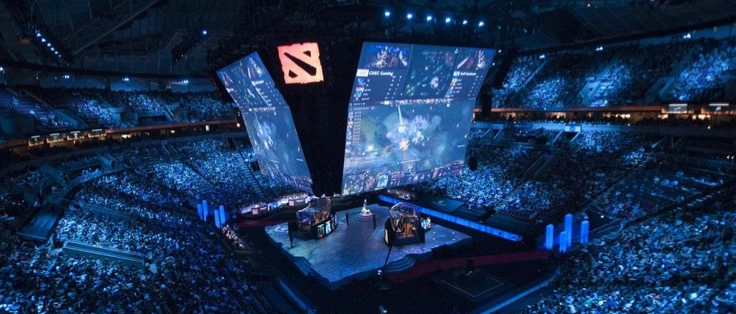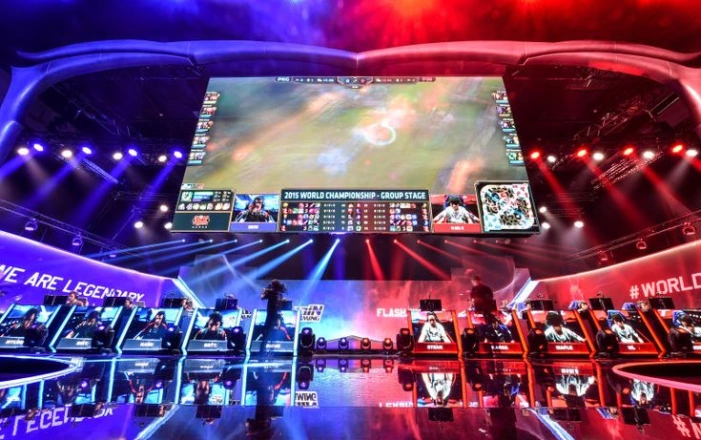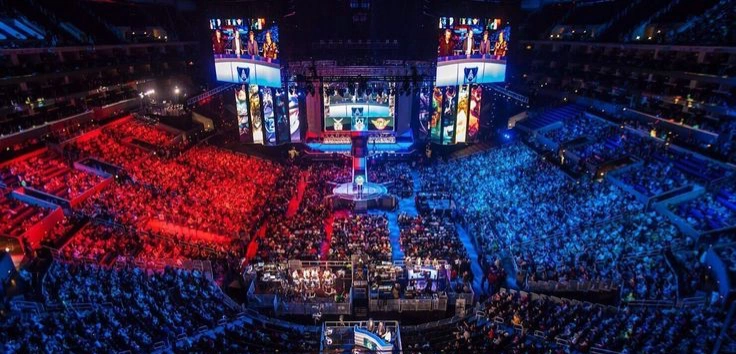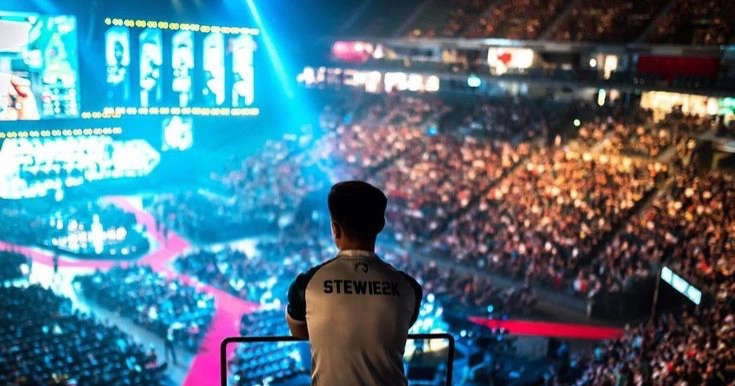photo Posts on Crowch
In 2025, Riyadh became the global capital of esports by hosting the Esports World Cup 2025, the largest tournament in the industry’s history. With a record-breaking prize pool of over $70 million, the event proved that esports is no longer a niche — it is now a core part of the global sports economy.
💰 Record-Breaking Prize Pool
The scale was unprecedented: 200 teams, 2,000 players, and 25 game titles. The highlight was the Club Championship, with $27 million dedicated to organizations rather than individuals. This structure echoed traditional sports leagues, strengthening the foundation for esports clubs.
📈 Economic Impact
EWC 2025 was both a sporting and economic milestone. Thousands of visitors came to Riyadh, while millions tuned in online. The tournament attracted significant investments, marketing partnerships, and created new revenue models — from streaming and advertising to merchandise and digital products.

🌟 Global Reach and Audiences
Esports has become truly global. By including a wide variety of genres — from shooters and strategy to sports simulations and chess — EWC 2025 appealed to a broad demographic. Esports is now a universal platform where everyone can find their favorite form of competition.
👥 Stars and Media Power
Cristiano Ronaldo and Magnus Carlsen served as iconic ambassadors, boosting the event’s visibility. Broadcasts broke viewership records, while fan culture — cosplay, fan art, and digital communities — turned the tournament into a cultural phenomenon.

🌐 A Strategy for the Future
EWC 2025 was also a cornerstone of Saudi Arabia’s Vision 2030 strategy. By investing in gaming and esports, the nation positioned itself as a hub for culture and innovation. With future initiatives like the Nations Cup and Olympic Esports Games, the industry’s growth looks unstoppable.
✨ Conclusion
The Esports World Cup 2025 proved that esports is more than competition — it is the economy of the future. The event showcased the industry’s readiness for sustainable growth, global integration, and a lasting sporting legacy.
The Esports World Cup 2025 in Riyadh was not only the biggest tournament in esports history but also a celebration that proved games can unite people just like traditional sports. From July 8 to August 24, Saudi Arabia’s capital became the heart of global esports culture.
🌍 A Festival of Esports
More than 2,000 players and 200 teams competed across 25 disciplines. From classics like Dota 2, League of Legends, and CS:GO to newcomers like Valorant, CrossFire, and even Chess, the event turned into a true festival where every fan could find their game.
👥 Fan Experience
Thousands of fans traveled to Riyadh to attend live matches, while millions tuned in online. The arenas buzzed with energy: light shows, fan zones, meet-and-greets with players, and cosplay made the championship feel more like a celebration than just a competition.
🌟 Icons and Ambassadors
The tournament gained even more prestige with global stars. Cristiano Ronaldo served as the face of the event, symbolizing the bridge between traditional and digital sports. Chess grandmaster Magnus Carlsen drew worldwide attention with his victory, proving that intellectual games are also part of esports’ future.

🏆 Competition and Records
With a record-breaking $70 million prize pool, EWC 2025 became the most prestigious tournament in esports history. The battles were fierce, with every match filled with emotion and strategy. The Club Championship was especially thrilling, as organizations competed for collective dominance across multiple games.
🌐 Global Significance
EWC 2025 was part of Saudi Arabia’s Vision 2030 strategy, positioning the country as a global hub for sports and entertainment. The event demonstrated that esports is not a niche hobby anymore but a worldwide movement with millions of fans and immense commercial potential.

✨ Conclusion
The Esports World Cup 2025 symbolized a new era. It showed that esports is more than just games — it is a universal language that unites generations, cultures, and nations.
Black Friday is one of the biggest events in the world of retail. It takes place the day after Thanksgiving in the United States and marks the beginning of the Christmas shopping season. Today, Black Friday has become a global phenomenon, spreading far beyond America’s borders.
The history of the term
The phrase “Black Friday” first appeared in the mid-20th century. Originally, it was used in Philadelphia to describe the heavy traffic and chaos on the streets after Thanksgiving, when crowds rushed to shop. Over time, the term took on a new meaning: on this day, many stores moved from being “in the red” (operating at a loss) to being “in the black” (turning a profit). Thus, Black Friday became a symbol of massive sales and economic gain.
Traditions and features

Black Friday is associated with huge discounts and early store openings. Many retailers launch sales at midnight or in the early morning, while eager shoppers line up hours or even days in advance. Sometimes, the frenzy leads to humorous or even chaotic situations, with people competing for limited quantities of popular items.
With the rise of the internet, Black Friday expanded beyond physical stores. Online platforms like Amazon have made the event accessible to millions of people around the world. For shoppers, it is an opportunity to buy electronics, clothing, and gifts at reduced prices; for retailers, it is a powerful way to attract customers and boost profits.
Global expansion
Although Black Friday originated in the United States, it is now celebrated in many countries. Across Europe, Latin America, Asia, and even Russia, retailers have adopted large-scale sales inspired by the American tradition. This makes Black Friday not only an economic event but also a cultural symbol of globalization.

Impact on economy and society
The economic impact of Black Friday is enormous. In the United States, sales on this day often reach tens of billions of dollars. However, the holiday has its critics: some see it as a symbol of excessive consumption, where people buy not out of need but because of discounts.
On the other hand, Black Friday remains an important driver for businesses and workers alike, from logistics companies to delivery services. For small businesses, it is also a chance to gain visibility in a highly competitive market.
Conclusion
Black Friday is more than just a day of discounts. It reflects the modern world: a combination of consumer culture, marketing, and global economics. For some, it is a holiday of bargains; for others, a reason to reflect on the value of material goods and consumer habits. One thing is certain: Black Friday has firmly established itself in the calendar of global events and continues to shape the rhythm of commerce in the 21st century.
Every October 5th, we celebrate World Teachers’ Day, a moment to honor the people whose work often shapes the direction of our lives. Teachers are not just transmitters of knowledge — they are catalysts for change, sources of inspiration, and guides through some of life’s most formative years.
Beyond the Lesson Plan
While a teacher’s job description may focus on academics, the reality goes far beyond textbooks and exams. In classrooms, teachers create environments where students feel safe to express themselves, ask questions, and take risks in learning. They notice the quiet student with untapped potential, the one struggling with self-confidence, and the one whose home life makes school the only place of stability.
Stories That Stay With Us
Almost everyone can recall at least one teacher who made a difference. Perhaps it was the elementary school teacher who noticed your talent for art and encouraged you to pursue it. Or the high school math teacher who stayed after class to help you understand a concept you thought you’d never master. Maybe it was the university professor who challenged your thinking and opened doors to new opportunities.
These moments may seem small at the time, but they can alter the course of a student’s life. Many successful people — from scientists to artists to leaders — credit a teacher for giving them the confidence to follow their dreams.
The Weight They Carry

Teaching is not without its challenges. Many educators work in underfunded schools, stretch their own budgets to buy classroom supplies, or spend late nights preparing lessons. They balance the needs of dozens of students while also meeting administrative demands and adapting to changing educational systems.
Despite these challenges, teachers often show remarkable dedication, driven by a genuine belief in the power of education to change lives.
A Global Day of Appreciation
World Teachers’ Day, established by UNESCO in 1994, is now celebrated in more than 100 countries. Events range from award ceremonies and public recognition programs to community gatherings where students and parents express gratitude. The day also serves as a platform to discuss important issues such as teacher shortages, professional training, and equitable pay.
How to Mark the Occasion

- Reach Out: Contact a teacher from your past and let them know the impact they had on you.
- Celebrate Locally: Participate in school or community events honoring educators.
- Promote the Profession: Share positive stories about teaching to inspire the next generation of educators.
- Advocate: Support initiatives that improve working conditions and resources for teachers.
Why This Day Matters
Education shapes not just individuals, but entire societies. Teachers are at the heart of that process. Recognizing their contribution is not just a courtesy — it is a commitment to valuing one of the most important professions in the world.
On October 5th, let’s remember the teachers who changed our paths, thank those who continue to guide the next generation, and work toward a world where every educator is respected, supported, and celebrated.
Digital identity today is no longer just an avatar, a username, or a profile on a social network. It’s the sum of all the traces you leave online — from simple likes to invisible interaction statistics, from your behavior in apps to voice recognition. You may not even notice it, but the digital world has long been collecting information about you — details you might never willingly disclose yourself.
We live in a reality where your identity is shaped not so much by what you say, but by how you behave: what you search for, what you listen to, how you move through a website, how you respond to content. Algorithms create a version of you and use it to recommend news, products, and even people based on how they “see” you. You exist as a set of patterns, probabilities, and behavioral signals. It’s convenient — smart technology saves time and adapts to your habits. But it’s also a vulnerability, because you don’t always control the version of yourself that’s being constructed externally.

Digital identity has moved far beyond the realm of mere convenience or website logins. It’s now an essential part of your public and professional reputation. Losing access to your accounts, leaking personal data, or resurfacing an old, thoughtless post — all of these can affect how others see you, whether they’re strangers, employers, or potential partners. Often, you won’t even get the chance to explain — the algorithm has already “decided” who you are.
In a world where the line between offline personality and digital self is fading, awareness becomes vital. You don’t have to be completely exposed to be authentic. Privacy isn’t about secrecy — it’s about choice. It’s the right to decide who you want to be and how much of that you choose to share. Managing your digital identity is no longer just a tech skill — it’s a form of emotional and personal maturity.
Everything you do online becomes part of your digital portrait. It evolves, updates, and changes with you — but not always on your terms. That’s why it’s not enough to simply exist online. You need to understand how you appear in that space. Who are you in the eyes of the system? Who are you to the stranger who types your name into a search bar?

The answers to those questions are shaping a new culture of identity — flexible, multilayered, digital. And it’s your choices that determine whether this identity becomes an extension of your freedom — or a limit to it.